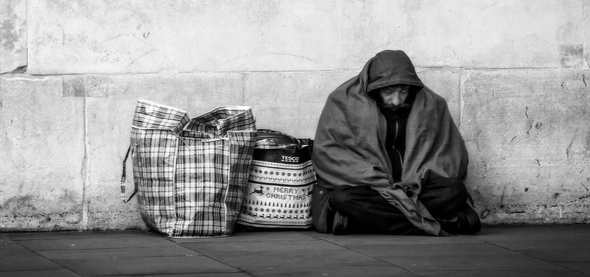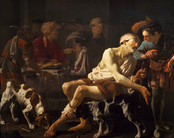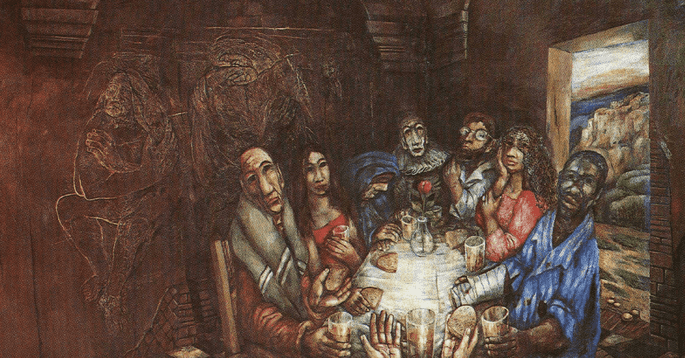 While the Pharisees and scribes grumbled that Jesus was receiving tax collectors and the marginal, the uneducated, outcasts living in “the streets and lanes of the city,” and “the poor and crippled and blind and lame” (14:21), eating with them, Jesus asked them a question:
The question sets up an expected answer: “No, no-one would do that!” Such a decision puts the 99 at risk (stop thinking Jesus means for us to assume the shepherd left the 99 well attended—that would spoil the story all together—not sure we are to assume nor fill in the blanks). Simply we have, you see,“Lost sheep happen.” Still, the angle Jesus shoots for is dangerously shocking: this rather well-off Shepherd (having 100 sheep would have indicated he leaned toward being a more wealthy Shepherd) goes and seeks his lost sheep, carries it home, and everyone rejoices. This is the counter to the grumbling of the Pharisees and scribes that Jesus was welcoming and eating with the likes of those strays from Galilee and the marginal he'd been picking up while on his way to Jerusalem. While it is good to see the Shepherd as a picture of Jesus, this leaves the listener/reader with nothing to do but contemplate how much Jesus loves him. A good thing and important, sure, but that’s not Luke’s point. This is a counter to the Pharisees and scribes, which should indicate what we have here is a counter-intuitive correction to the church’s proclivity toward doing exactly what the Pharisees and scribes were doing: neglecting the poor and marginal and socially unacceptable, whether it be to affirm the cultural and socially tiered-hierarchies (both church and outside the church) and/or to not be so unwelcoming of such among them as a church and/or creating and maintaining institutional systems that affirms and sustains the haves/have-nots at church (cf. the problem in James). This is exactly what the previous Banquet parable was about in Luke 14. Additionally, the interlude on discipleship just prior (14:25-33) instructs us that discipleship is following Jesus, and thus we have our marching orders here in this (and the next two) parables of Luke 15.
0 Comments
 Been dwelling some in Luke’s parable of the Father, stay at home son, and the prodigal son. First, the trio-parable set in Luke 15 is not about our individual salvation nor a focus on simply the Father’s love for me--it is incredibly more and speaks loudly to the habits and the forming of church. We need to hear how, in fact, Luke starts chapter 15: “Now the tax collectors and sinners were all drawing near to hear him. And the Pharisees and the scribes grumbled, saying, ‘This man receives sinners and eats with them’ (vv. 1-2). So, the issue is pretty clear: The temple-leadership had a problem with Jesus’ welcoming of the unclean, marginal, socially unacceptable and despised to the table of fellowship. What is often overlooked in the wider context is that Luke’s chapter 15 set of parables is surrounded (preceded and followed) by “feasting” and “eating” lessons. (We’ll get to this in a moment.) Additionally, Luke’s three-parable set is also about “feasting” and “eating.” For in both the first two Luke 15 parables, after what was lost is found, there is a gathering of friends and neighbors for rejoicing: “And when he comes home, he calls together his friends and his neighbors, saying to them, ‘Rejoice with me, for I have found my sheep that was lost’” (v. 6). Likewise when the prodigal son returns, he is welcomed into a feast as the honored guest (vv. 24-27).
The wider narrative in Luke suggests that it is whom we invite to these “feasts” and times of “eating” that is at issue. For Luke 15 is bracketed by chapters/stories of "feasting" (i.e., "eating"). First, there is the parable about proper kingdom table etiquette (the inviting of the marginal and socially unacceptable) vs. the acceptable social norms (chapter 14) and, then in the preceding chapter, the story of a rich man, who “feasted sumptuously” and poor Lazarus, “who desired to be fed with what fell from the rich man's table” (16:20-21). The lost-dead-prodigal-son isn’t just a picture of the wayward sinner, the lost law-breaker, but is a figure representing--to keep with Luke's theme--the socially unacceptable that are now welcome, equally, without hesitation or qualification (save faith) to God’s kingdom table. These parables, including Luke 15's parable of the prodigal son, are forming for church and missional church-life. Luke 15 is one of the parables that scream out: “Go do likewise!” Who are you eating with? Who are you intentionally inviting and compelling to come be a part of your local church? Maybe even more so, who are you making second class citizens of the kingdom by how we do church? “The Pharisees and their scribes began grumbling at His disciples, saying, ‘Why do you eat and drink with the tax collectors and sinners?’” (Luke 5:30). Was struck this morning in my daily Bible reading concerning the phrase “tax collectors and sinners.” If we, that is the church (the body of Christ) that is now the presence of the ascended Jesus (that is his body in a place), how is it that we (not as individuals, which is a wholly modernist and ‘merican notion of church applied to the nature of the Christian life, i.e., replacing “wēs” with “I”) are not at a place--in a space--where we are accused of “eating and drinking” (there’s the idea of meals again) with “tax collectors and sinners”?
Instead, we are safely tucked into a building designed and with habits to distinguish who's in and who's out, where all leveling is errased, and we have power over guests; a place where we can escape being aligned with the “Son of Man” and being maligned as a gluttonous group and drunkards, friends “with tax collectors and sinners.” And, gathered in a space that is, in many places, not at all welcoming (easily accessible by design and by default) to “tax collectors and the sinners” to come near to find Jesus and to listen to him. Now such association with the likes of these people and populations, that is the equivalent to “tax collectors and sinners,” is relegated to church programs outside of the practice (i.e., worship) of the body, to specialists and volunteers, and carefully guarded and designed events. (Don't get me wrong, I know it is important to have worship time—but the early church met in homes that allowed for a mixture of believing and unbelieving to be present, both around the table and within eye-sight and ear-shot.) I am impressed, however, with the idea, amid the wider reading of the New Testament, that this is a church problem, not a volunteer or scheduling problem. These texts (and way too many like them, e.g., Matthew 9:9–13) are ignored as texts to be applied to the body of Christ (local). How does the body of Christ, not individual Christians severed, apart from the gathered body—on their own time and amid their own convictions and conscience and resources—but, the church be Jesus in this way so that “tax collectors and sinners” are seated at the table in his midst? Perhaps, then, we will, once again be accused of eating and drinking and associated with the marginal and despised, tax collectors and the sinners. Rethinking church. |
AuthorChip M. Anderson, advocate for biblical social action; pastor of an urban church plant in the Hill neighborhood of New Haven, CT; husband, father, author, former Greek & NT professor; and, 19 years involved with social action. Archives
February 2024
Categories
All
|
Pages |
More Pages |
|

 RSS Feed
RSS Feed